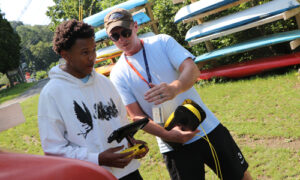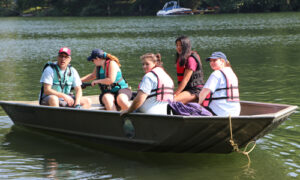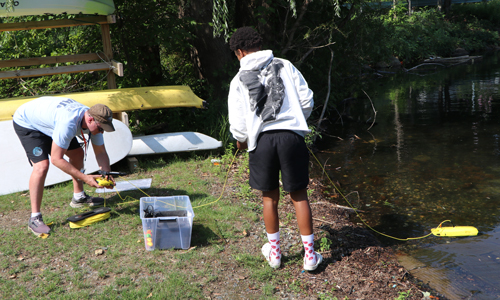DANBURY, Connecticut — A National Oceanic and Atmospheric Administration (NOAA) Bay Watershed Education and Training (B-Wet) grant to increase teacher and student knowledge about watersheds has provided the resources for a collaborative research project to study the health of local bodies of water being conducted by Western Connecticut State University graduate students, Danbury High School students and the Danbury Department of Public Works.
Two Fairfield County high school science teachers, David Herberger and Gregory Lewis, are currently pursuing Master of Science degrees in WCSU’s Integrative Biological Diversity program. Herberger teaches at Darien High School and Lewis teaches at Stamford High School. As part of their graduate degree program, they are working with four Danbury High School students who were selected to be Summer Watershed Steward Ambassadors as a result of their proposals for potential research projects into actual local watershed problems like stormwater management. The Danbury students are Halle Alysandratos, Alondra Lenz, Tumiso Leshiba and Camila Gonzalez.
One area of research is to determine whether carp previously introduced into Squantz Pond and Candlewood Lake to control invasive Eurasian watermilfoil have gone on to negatively impact native specifies of vegetation.

Lewis said he enrolled in WCSU’s Master of Science in Integrative Biological Diversity program to enhance his career as a science teacher. “I wanted to further my own science education and knowledge,” he said during an interview while he was conducting research at Squantz Pond. “I live in Ridgefield, so it’s close and an easy commute when I have class. So far, the program has been great, very welcoming and I’ve learned a lot,” he added.
Herberger also spoke from Squantz Pond and said he enrolled “because I wanted to get a master’s degree in science and I had heard WCSU’s program had a good reputation. They do a lot of active field research for graduate students and build a lot of skills. In science, that’s a big key — it’s not just theory, but actually getting out into the field, doing projects, and having the freedom to do the kinds of projects you want to do to pursue your goals and interests.”

On a recent Wednesday in mid-July, Herberger, Lewis and the Danbury High School Summer Watershed Steward Ambassadors were joined by Danielle Shubat, a Resource Assistant at the Connecticut Department of Energy and Environmental Protection Inland Fisheries at the Squantz Pond loading dock. “We’re working right now with Western Connecticut State University and they have high school students here with us,” she said. “We’re doing carp monitoring with them and getting the students to learn some water quality testing programs.”
After demonstrating boat safety, Shubat added, “Really, we’re trying to get the high school students into environmental science and learning about the different techniques that we as scientists use.”
This summer’s unpredictable weather has made conducting research on the lake interesting.
“When you’re out here doing the data collection, you have to deal with what nature hands you,” Lewis said. “We’ve had a couple of heavy rain events, which have murkied up the water a bit and made it a little harder to collect some data, but we planned our approach over the next couple of weeks pretty well, so I think we’re ready to handle any curveballs that get thrown at us. So far, so good.”
Herberger added that the high school students have been “absolutely fantastic” and that the research they are conducting is truly important. “The situation with vegetation in the lake isn’t really talked about that much, and that’s a big surprise. There are a lot of people who don’t know what’s going on in their own backyard, and this could have a big effect on the entire lake and the whole community. The stakeholders don’t really understand the consequences of what could happen if there were no more aquatic plants in the lake.”
For more information, contact Dr. Theodora Pinou at pinout@wcsu.edu or WCSU Public Relations at pr@wcsu.edu.
Western Connecticut State University changes lives by providing all students with a high-quality education that fosters their growth as individuals, scholars, professionals and leaders in a global society. Our vision: To be widely recognized as a premier public university with outstanding teachers and scholars who prepare students to contribute to the world in a meaningful way.

